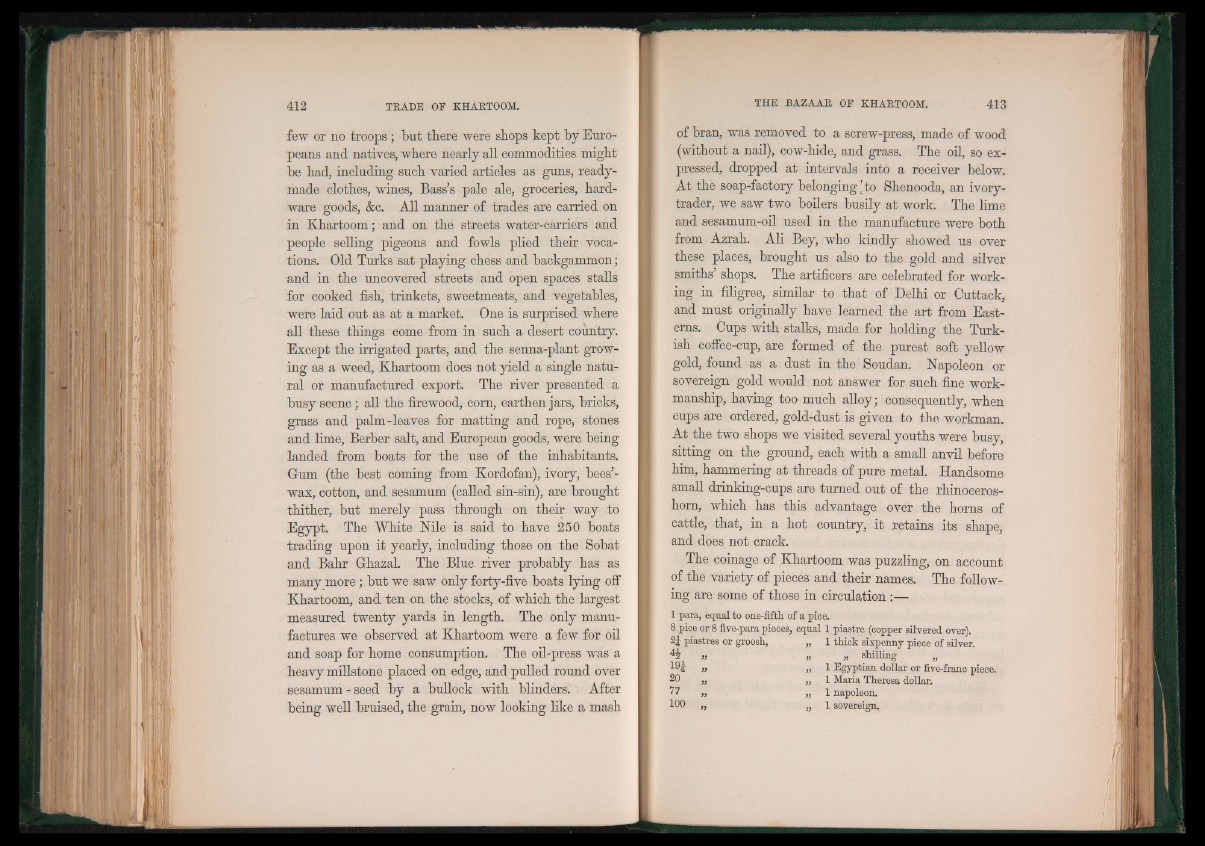
few or no troops; but there were stops kept by Europeans
and natives, wbere nearly all commodities might
be had, including such varied articles as guns, readymade
clothes, wines, Bass’s pale ale, groceries, hardware
goods, &c. All manner of trades are carried on
in Khartoom; and on the streets water-carriers and
people selling pigeons and fowls plied their vocations.
Old Turks sat playing chess and backgammon;
and in the uncovered streets and open spaces stalls
for cooked fish, trinkets, sweetmeats, and vegetables,
were laid out as at a market. One is surprised where
all these things come from in such a desert country.
Except the irrigated parts, and the senna-plant growing
as a weed, Khartoom does not yield a single natural
or manufactured export. The river presented a
busy scene; all the firewood, com, earthen jars, bricks,
grass and palm-leaves for matting and rope, stones
and lime, Berber salt, and European goods, were being
landed from boats for the use of the inhabitants.
Gum (the best coming from Kordofan), ivory, bees’-
wax, cotton, and sesamum (called sin-sin), are brought
thither, but merely pass through on their way to
Egypt. The White Nile is said to have 250 boats
trading upon it yearly, including those on the Sobat
and Bahr Ghazal. The Blue river probably has as
many more; but we saw only forty-five boats lying off
Khartoom, and ten on the stocks, of which the largest
measured twenty yards in length. The only manufactures
we observed at Khartoom were a few for oil
and soap for home consumption. The oil-press was a
heavy millstone placed on edge, and pulled round over
sesamum-seed by a bullock with blinders: j After
being well bruised, the grain, now looking like a mash
of bran, was removed to a screw-press, made of wood
(without a nail), cow-hide, and grass. The oil, so expressed,
dropped at intervals into a receiver below.
At the soap-factory belonging ’to Shenooda, an ivory-
trader, we saw two boilers busily at work. The lime
and sesamum-oil used in the manufacture were both
from Azrah. Ali Bey, who kindly showed us over
these places, brought us also to the gold and silver
smiths’ shops. The artificers are celebrated for working
in filigree, similar to that of Delhi or Cuttack,
and must originally have learned the art from Easterns.
Cups with stalks, made for holding the Turkish
coffee-cup, are formed of the purest soft yellow
gold, found as a dust in the Soudan. Napoleon or
sovereign gold would not answer for such fine workmanship,
having too much alloy; consequently, when
cups are ordered, gold-dust is given to the workman.
At the two shops we visited several youths were busy,
sitting on the ground, each with a small anvil before
him, hammering at threads of pure metal. Handsome
small drinking-cups are turned out of the rhinoceros-
horn, which has this advantage over the horns of
cattle, that, in a hot country, it retains its shape,
and does not crack.
The coinage of Khartoom was puzzling, on account
of the variety of pieces and their names. The following
are some of those in circulation :—
1 para, equal to one-fifth, of a pice.
8 pice or 8 five-para pieces, equal 1 piastre (copper silvered over).
2J piastres or groosh, „ 1 th ick sixpenny piece of silver.
4i » » „ shilling „
1 Egyptian dollar or five-franc piece.
1 Maria Theresa dollar.
1 napoleon.
1 sovereign.
20
77
100